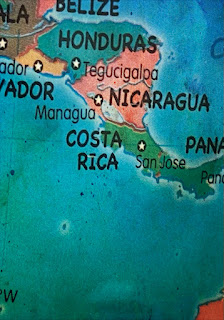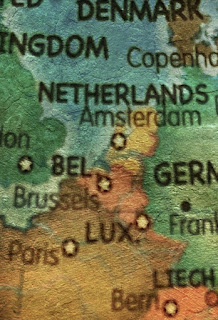READ
The
Inhabited Woman, written
by Gioconda Belli and translated by Kathleen March, tells the story of Lavinia
Alarcón, a well-off, educated young woman
living in the fictional city of Faguas. She lives alone in the house left to
her by her beloved Aunt Inés, and in the opening chapter, she is
about to start work at the first job she’s ever had, working as an architect in
a local firm.
Lavinia’s family is near the top of the social hierarchy, a group of aristocrats known as the “Greens.” While the Greens are envied and deferred to, control of the country appears to rest in the hands of the “Blues,” who are considered to be low-class, uneducated, and nouveau riche. The dictator who rules the country, whom people refer to as the Great General, is a Blue. And then there are the people who are just trying to live their lives – the workers. They are not happy with the brutality and corruption of the Great General and his followers, and a revolution is brewing.
Although Lavinia belongs to the upper class, she is not without sympathy for those who don’t have her advantages. Her first assignment at the architectural firm is to visit the site of a proposed shopping center for which her firm has drafted the blueprints. She discovers that the shopping center will require the demolition of a low-income barrio and that troubles her. When she returns to the office, she confronts her co-worker, Felipe, about the situation, but he says nothing can be done.
Before long, Lavinia finds herself in a relationship with Felipe, but she can tell he’s hiding something. When he arrives at her house in the middle of the night with a man who has been shot, she discovers that Felipe is a member of a rebel group called the National Liberation Movement. Shortly thereafter, Lavinia becomes a member of the group too.
Interwoven throughout the book are thoughts emanating from the orange tree outside Lavinia’s window. The tree apparently possesses the spirit of Itzá, a young woman warrior who helped battle the Spaniards hundreds of years previously. She understands and empathizes with the inner turmoil that Lavinia experiences as she transforms from a privileged, relatively sheltered young woman into a soldier for justice.
It should be noted that the author herself came from a wealthy background in Managua, Nicaragua. While working as an account executive in an advertising agency, she got involved in the struggle to overthrow the Somoza dictatorship. Belli became the press liaison for the Sandinista National Liberation Front, and later she was named director of State Communications. She is no longer a member of the Sandinistas, and has become critical of the government that she helped put in power. As a result, she now lives in exile in Spain.
COOK
“Their lunch consisted of a tortilla with rice and beans and a cup of coffee. Lorenzo, René, and even Felipe ate skillfully, using their hands without being squeamish. Lavinia tried to hide her discomfort, the difficulty she had in eating rice and beans neatly, without silverware, with just the tortilla to help her, unable to help spilling the purple and white grains.”
I found a simple recipe on the Casablanca Cooks website for gallo pinto – Nicaraguan rice and beans. The ingredients were very basic: small red beans, white rice, onion, vegetable oil, and salt. Served with corn tortillas, this was a very satisfying meal. And no, I did not eat it with just the tortilla – I cheated and used a fork.
GIVE
GlobalGiving had
several projects on their website that I would have been happy to support, but
the one that caught my eye was the one teaching children how to be nature
stewards. According to the project description: “Climate change is already
impacting lives and livelihoods, especially in the tropics. Nicaragua’s climate
problems are exacerbated by widespread exploitation of ecosystems, land, and
wildlife. To restore its natural resilience, forest and local biodiversity need
protection and care. Nearly one-third of Nicaragua’s population is under the
age of 15. This rising generation is the key to change.”
The plan is to created a junior ranger program for children between the ages of 8 and 13. They will learn about the forests and beaches near where they live, and they will be given opportunities to plant trees, do beach cleanups, and take part in sea turtle releases. It is hoped that the children will become nature stewards and will share their knowledge with friends and family.
More information about this project is available at Nicaragua's Nature Stewards: The Junior Rangers - GlobalGiving.
NEXT STOP: NIGER




















